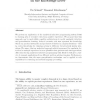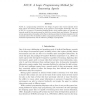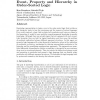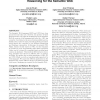711 search results - page 34 / 143 » Knowledge Representation and Reasoning in (Controlled) Natur... |
COGSR
2011
13 years 4 months ago
2011
We present an application of the analytical inductive programming system Igor to learning sets of recursive rules from positive experience. We propose that this approach can be us...
CORR
2004
Springer
13 years 9 months ago
2004
Springer
FLUX is a programming method for the design of agents that reason logically about their actions and sensor information in the presence of incomplete knowledge. The core of FLUX is...
ICLP
1999
Springer
14 years 1 months ago
1999
Springer
Knowledge representation in logics, even in the order-sorted logic that includes a sort hierarchy, tends to lose the conciseness and the nuances of natural language. If we could c...
LREC
2008
13 years 10 months ago
2008
In the field of Natural Language Processing, in order to work out a thematic representation system of general knowledge, methods relying on thesaurus have been used for about twen...
WWW
2005
ACM
14 years 10 months ago
2005
ACM
The Semantic Web languages RDFS and OWL have been around for some time now. However, the presence of these languages has not brought the breakthrough of the Semantic Web the creat...




